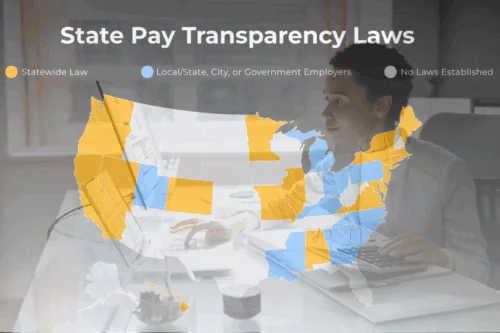Welcome to your essential guide on Arizona employment laws! Whether you’re beginning your first job or transitioning careers, this guide will equip you with critical insights into the legal landscape shaping your workplace rights and responsibilities in Arizona.
Why This Guide is Vital for You
Understanding the intricacies of Arizona employment laws is not just about legal compliance; it’s about empowering yourself to make informed decisions in the workforce. Here, we’ll explore everything from minimum wage standards and overtime rules to protections against discrimination and rights under the FMLA.
We know the world of employment laws can seem complex and intimidating, but with this guide, we aim to break down legal jargon into easy-to-understand terms. So, let’s dive in and unlock the keys to a fulfilling and secure professional journey in the grand state of Arizona!
Understanding Arizona Employment Laws
Arizona employment laws set the framework for fair and legal practices in workplaces across the state. Understanding these regulations is essential for employers and employees alike to ensure compliance and protect rights.
Overview of Key Laws
Arizona follows both federal and state laws that influence employment conditions. These laws cover various aspects of employment, such as wage rates, working hours, and discrimination policies. Additionally, the state enforces specific laws tailored to meet the unique needs of its workforce.
Roles of State and Federal Regulations
While federal employment laws provide a baseline, Arizona laws sometimes offer additional protections. For instance, the state’s minimum wage is higher than the federal minimum. Thus, employers must comply with the more stringent standards to stay lawful.
Importance of Compliance
Adhering to Arizona’s employment laws is crucial for companies to avoid penalties and for workers to understand their rights. Non-compliance can lead to significant legal challenges, affecting both reputation and finances.
This knowledge helps create a supportive and fair workplace. It ensures all parties are treated justly and equitably, mirroring the principles of inclusive employment practices.
Minimum Wage and Overtime Rules
Arizona’s financial treatment of workers hinges on specific laws governing minimum wage and overtime, ensuring workers are fairly compensated for their time and efforts.
State Minimum Wage
As of 2024, Arizona has set its minimum wage above the federal requirement. This rate is updated annually based on cost of living adjustments. Employers in the state must adhere to this rate, providing at least the minimum hourly wage to their employees. The Arizona Minimum Wage Act (Proposition 206) was passed in 2016. The law mandates annual adjustments to the minimum wage based on the cost of living. The Industrial Commission of Arizona (ICA) is responsible for updating and publishing the minimum wage rate annually.
Overtime Regulations
Overtime pay is another critical area under Arizona employment laws. Employees who work more than 40 hours a week are typically entitled to overtime pay, which is 1.5 times the regular pay rate. Understanding these regulations can help employees ensure they receive proper compensation for extended work hours.
Exceptions and Exemptions
There are exceptions to overtime and minimum wage laws based on the type of employment. For example, exempt salaried employees do not qualify for overtime under certain conditions. Both employers and employees need to understand who falls under these exemptions:
- Executive, administrative, and professional employees
- Outside sales employees
- Certain computer-related roles
Compliance with these laws supports fair labor practices and reinforces the ethical standards within a workplace, like those examined in the Ultimate Guide to Workplace Diversity. Workers and employers can visit the Arizona Industrial Commission for detailed information about specific rates and exceptions.
Workplace Discrimination and Employee Rights
Arizona employment laws strongly guard against workplace discrimination, promoting equal opportunity for all workers regardless of background.
Protected Classes
In Arizona, employment discrimination is prohibited in several categories. These protected classes include age, race, color, religion, sex, national origin, and disability. Also, Arizona law covers sexual orientation and gender identity, expanding protections beyond federal mandates.
Right to Lodge Complaints
Employees who believe they have experienced discrimination can file complaints with the Equal Employment Opportunity Commission (EEOC). This process is crucial for addressing grievances and enforcing rights.
Workplace Harassment
Additionally, Arizona’s laws are firm on preventing workplace harassment, which includes unwelcome behaviors like bullying or inappropriate comments. Employers must establish clear anti-harassment policies. These principles ensure workplaces support workplace diversity norms.
Health and Safety Regulations in Arizona
Arizona employment laws prioritize the health and safety of workers, ensuring safe workplace conditions across all industries.
OSHA Compliance
Businesses in Arizona must comply with the Occupational Safety and Health Administration (OSHA) standards. These regulations are designed to prevent workplace injuries and illnesses, especially heat-related ones. Following these guidelines is crucial for keeping environments safe for all employees.
Required Safety Measures
Under these laws, employers must provide necessary safety equipment and training. This includes:
- Protective gear for hazardous jobs
- Cooling stations for workers outside
- Regular safety drills
- Emergency response plans
Reporting and Addressing Hazards
Workers have the right to report unsafe conditions without fear of retaliation. They can submit reports directly to Arizona’s Division of Occupational Safety and Health (ADOSH) for action.
Cultivating a secure work environment helps companies comply with Arizona employment laws and enhance productivity and employee satisfaction. Therefore, attentiveness to health and safety becomes a cornerstone of successful business operations in Arizona.
Family and Medical Leave Act (FMLA) Compliance
Arizona aligns with federal standards under the Family and Medical Leave Act (FMLA), ensuring eligible employees can take necessary leave for family and medical reasons without fear of job loss.
Eligibility Requirements
To be eligible for FMLA in Arizona, employees must:
- Work for the employer for at least 12 months.
- Have at least 1,250 service hours during the 12 months before the leave.
- Work at a location where the employer has at least 50 employees within 75 miles.
Types of Leave Covered
Under FMLA, employees in Arizona can take up to 12 weeks of unpaid leave in 12 months for:
- The birth and care of a newborn child
- Adoption or foster care placement of a child
- Care for an immediate family member with a severe health condition
- A serious health condition that makes the employee unable to perform job functions
Protection and Benefits
During FMLA leave, employees are entitled to maintain health benefits, and upon return, they must be reinstated to the same or an equivalent position. This ensures that taking leave does not negatively impact their career stability.
It is crucial for employees to understand these rights and for employers to honor them, as they are fundamental to supporting workers during pivotal life moments. Additional details about FMLA provisions can be found on the U.S. Department of Labor’s website. Adherence to FMLA complements broader employment diversity initiatives, underlining the importance of equitable treatment in the workplace.
Termination and Unemployment Laws
Under Arizona employment laws, understanding the rules around employment termination and unemployment benefits is crucial for both employees and employers.
At-Will Employment
Arizona operates under the at-will employment doctrine, meaning the employer or employee can end the employment relationship without cause or prior notice. However, terminations cannot violate anti-discrimination laws or contractual agreements.
Unemployment Benefits Eligibility
Employees who are terminated without cause might be eligible for unemployment benefits. To qualify, individuals must meet several criteria:
- They must have lost their job through no fault of their own.
- They must meet work and wage requirements during a base period.
- They must be ready and available to work and actively seek employment.
Process for Filing Claims
To file for unemployment benefits in Arizona, individuals should apply through the Arizona Department of Economic Security (DES). Applicants should provide accurate and complete information to avoid delays in receiving benefits.
Understanding these laws helps businesses manage risks associated with wrongful termination claims, reinforcing a fair dismissal process. This knowledge promotes a stable work environment, aligning with inclusive practices.
Connecting with Inclusive Employment Practices
In addition to specific legal protections and rights, Arizona employment laws also encourage inclusive employment practices to breed diverse and equitable workplaces.
Inclusion in Recruitment and Promotion
Arizona employers are encouraged to adopt recruitment and promotion practices that ensure diversity. This includes strategies like:
- Posting job openings in diverse communities.
- Offering internships and mentorship programs to underrepresented groups.
- Implementing bias-free recruitment processes.
Training and Development
Furthering employee training on diversity and inclusion is vital. Workshops and continuous learning sessions can help build an understanding and appreciation of diverse backgrounds, positively impacting team cohesion and productivity.
State Support for Diversity Initiatives
The state of Arizona provides resources and guidance for businesses looking to enhance their diversity practices. Employers can access these resources through the Governor’s Office of Youth, Faith, and Family.
Embracing these inclusive practices aligns with Arizona employment laws and contributes to a supportive and dynamic work environment.
Laws Affecting Government and Economic Sectors
Arizona employment laws also impact the operations within the governmental and economic sectors, ensuring transparency and ethical practices.
Public Sector Employment Laws
Arizona public sector employees are governed by specific laws that ensure their activities align with public interest considerations. These include:
- Strict adherence to ethical standards and conflict-of-interest laws.
- Requirements for transparency in operations and decision-making.
Economic Development Initiatives
Meanwhile, the economic sector benefits from laws that promote growth and innovation. Arizona supports businesses with incentives like tax breaks and grants, especially in the technology and renewable energy sectors. This support helps create jobs and boosts the state’s economy.
Collaboration with Private Sectors
The state collaborates with the private sector to accelerate economic development, which is essential for advancing public and economic welfare.
These aspects of Arizona employment laws highlight their wide-ranging influence beyond standard workplace regulations. They are pivotal in shaping the state’s broader economic and governmental landscape.
FAQs About Arizona Employment Laws
What is the minimum wage in Arizona?
Arizona’s minimum wage is subject to annual adjustments depending on changes in the cost of living. It is currently above the federal minimum wage.
How do I file a complaint for workplace discrimination in Arizona?
Employees can file a discrimination complaint with the Arizona Civil Rights Division or the federal Equal Employment Opportunity Commission (EEOC).
Are Arizona employers required to provide break periods?
Arizona does not have specific laws requiring breaks for most businesses, but employers are encouraged to provide reasonable break periods during shifts.
Can I be fired without notice in Arizona?
Yes, Arizona is an at-will employment state, meaning either the employer or the employee can terminate employment without notice unless a contract states otherwise.
What are my rights if I’m terminated from my job in Arizona?
If terminated, you might be eligible for unemployment benefits if you meet specific criteria, such as being unemployed through no fault of your own and actively seeking work.
How does FMLA work in Arizona?
Eligible employees can take up to 12 weeks of unpaid leave for specified family and medical reasons, and they will continue to receive group health insurance under the same terms as if they had continued to work.
Conclusion
Arizona employment laws provide a robust framework designed to protect workers and promote fair practices within the workplace. From ensuring fair compensation through minimum wage and overtime rules to upholding rights under the FMLA and addressing workplace discrimination, these laws help maintain a balanced work environment. Compliance not only supports the well-being of employees but also enhances the overall integrity and productivity of businesses.
Take Action
If you want to advance your career in a diverse and inclusive environment, join Diversity Employment and upload your resume today! Here, you’ll find resources, job listings, and support to help you navigate your career path effectively in Arizona and beyond. Embrace the opportunity to work with employers who value diverse staffing jobs as much as you do.
Stay informed, stay protected, and take proactive steps towards a rewarding career by understanding and leveraging Arizona employment laws. Join today and let us help you connect with your ideal job in an inclusive and fair workplace!




